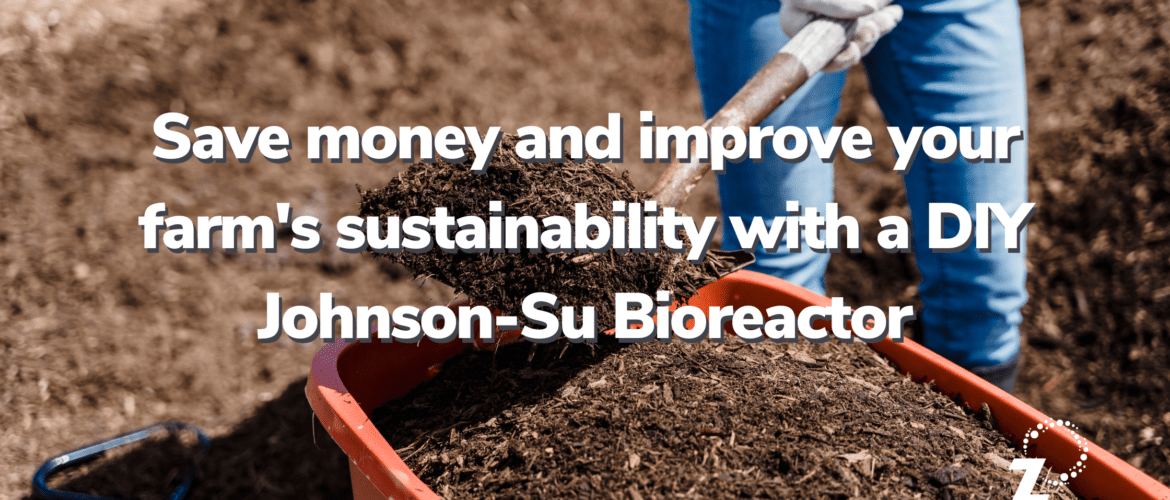
The Benefits of Using a Johnson-Su Bioreactor
As a South African farmer, you are always looking for ways to improve your yields and reduce your expenses. One method that has gained popularity in recent years is the use of a Johnson-Su bioreactor to produce your own on-farm biology. This system can help to improve soil health and fertility, resulting in healthier crops and higher yields.
What is a Johnson-Su bioreactor?
A Johnson-Su bioreactor is a simple and inexpensive system that can be used to produce high-quality compost and liquid fertilisers. It is named after its creators, David Johnson and his wife Hui-Chun Su, who developed the system in the 1990s. The bioreactor is essentially a container filled with organic materials, such as straw, hay, brown material, manure, or wood chips, that are inoculated with a mixture of beneficial microorganisms.
How does it work?
The key to the Johnson-Su bioreactor is the mixture of microorganisms that are added to the organic material. These microorganisms include bacteria, fungi, protozoa, and nematodes, which work together to break down the organic material and release nutrients that are beneficial to plants. The microorganisms also help to improve soil structure and water-holding capacity, which can lead to healthier plants and higher yields.
The composter is easy to build, and the design allows the compost to be aerated without needing to be turned. It does not smell or attract flies. After adding the organic materials and the microorganisms, the compost takes 12 to 18 months to decompose, after which it has a clay-like consistency and can be applied as an extract, a soil amendment or used to coat seed.
A farmer in Standerton who uses Zylem’s products and is transitioning to regenerative practices uses Johnson-Su’s bioreactor systems to create compost and soil amendments for seed. He’s also commissioned a worm farm with the main intention of providing worms for the bioreactors. He’s already reaping the rewards of a more resilient and cost-effective system. You can read more about his story here.
5 benefits of using a Johnson-Su bioreactor
Using a Johnson-Su bioreactor can have a number of benefits for South African farmers. First, let’s compare it to typical commercial windrow composting processes. These are often designed and operated for speed and maximum product flow. This focus does not allow the compost to degrade sufficiently and produces an immature compost. Most home composting methodologies require building a heap and turning it at regular intervals. Both of these composting processes (windrow and static heap) can produce undesirable odours, attract flies, and cause problems with neighbours.
In contrast, when built and maintained correctly, the static heap Johnson-Su bioreactor never needs turning, never produces odours, and does not attract flies. This reactor design allows the material to be composted aerobically, allowing complete biological breakdown of compost materials and resulting in a microbially diverse, fungal-dominant compost product.
Here are 5 benefits of using a Johnson-Su Bioreactor:
- No turning required: Unlike traditional windrow and static pile composting methods, the Johnson-Su bioreactor does not require the compost to be turned. This saves time and labour and reduces the risk of exposure to harmful microorganisms.
- No odours: The Johnson-Su bioreactor is designed to be odour-free. This is because the system provides optimal aeration, which helps to reduce the production of foul-smelling gases.
- No flies: Flies are attracted to decomposing organic matter, but the Johnson-Su bioreactor is designed to prevent them from accessing the compost. This helps to reduce the risk of insect infestations and eliminates the need for chemical insecticides.
- High-quality compost: The Johnson-Su bioreactor allows for optimal aerobic conditions, which encourages the growth of beneficial microorganisms. This helps to create a nutrient-rich compost that is teeming with beneficial bacteria and fungi.
- Consistent results: Because the Johnson-Su bioreactor is a closed system, it provides consistent results every time. This makes it an ideal choice for commercial-scale composting operations.
The end product can help improve soil health, leading to healthier crops and higher yields. Compost from a Johnson-Su can reduce the need for chemical fertilisers, which are expensive and can be harmful to the environment and to human health.
Building your own Johnson-Su bioreactor
Building your own Johnson-Su bioreactor is relatively easy and inexpensive. You will need a container with a lid, such as a plastic drum or a metal tank, and some organic materials to fill it. You will also need to source some beneficial microorganisms, which can be obtained from RegenZ.
From farm waste to rich compost: Here’s a step-by-step guide to building a Johnson-Su Bioreactor
- Choose a container that is at least 200 litres in size and has a tight-fitting lid. A plastic drum or a metal tank works well.
- Drill several small holes in the bottom of the container to allow for drainage.
- Fill the container with organic materials, such as straw, hay, or wood chips. Aim for a mix of carbon-rich and nitrogen-rich materials to achieve a good balance.
- Add a mixture of beneficial microorganisms like Tiny Team to the organic materials. This can be obtained from a reputable supplier or by making your own compost tea.
- Water the organic materials until they are damp but not soaking wet.
- Cover the container with the lid and leave it to sit for a few days. Check the moisture level regularly and add water if necessary.
- After a week or two, the organic materials should start to break down and turn into compost. You can test the compost by smelling it – it should have a sweet, earthy smell.
- Once the compost is ready, you can use it to fertilise your crops. You can also use the liquid that drains from the bottom of the container as a liquid fertiliser.
There are also plenty of videos on YouTube to guide you through the process.
Unlock the power of microorganisms
Building a Johnson-Su bioreactor is a simple and inexpensive way for South African farmers to improve soil health and fertility, leading to healthier crops and higher yields. By using this system, you can reduce your reliance on chemical fertilisers and improve the sustainability of your farm. It can also be a fun and rewarding project to help you learn more about the biology of your soil and how to improve it. So why not give it a try and see the benefits for yourself? Order your Tiny Team probiotic soil inoculant here to get started.

About the Author: Justin Platt
Justin is the Founder & CEO of Zylem and RegenZ. Justin has a BSc in Plant Pathology and Botany from UKZN. He has been involved in the agricultural services industry since graduating in 1979. Justin has a passion for regenerative agriculture.